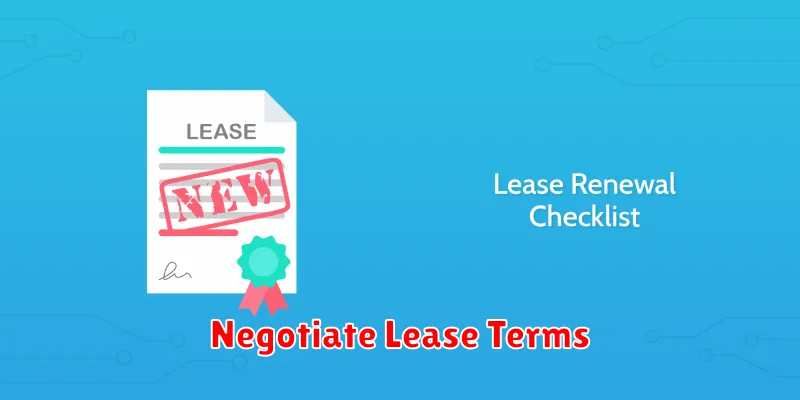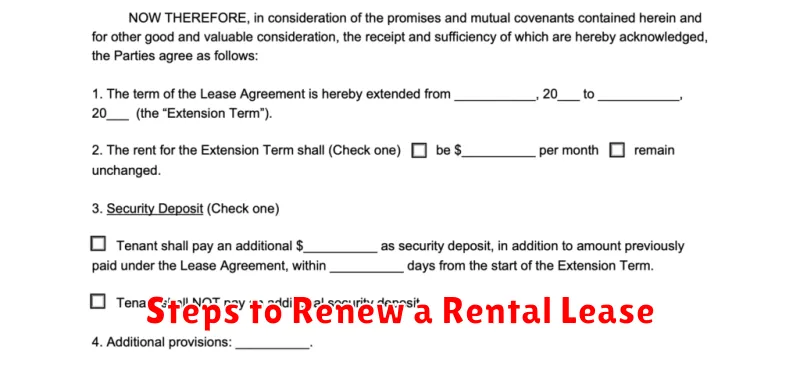Renewing a rental lease is a crucial step for both landlords and tenants. A lease renewal signifies the continuation of a pre-existing rental agreement, outlining the terms and conditions for an extended period. This process involves careful consideration, negotiation, and documentation to ensure both parties are in agreement regarding the renewed lease terms, including rent adjustments, property maintenance, and other crucial aspects. Whether you are a tenant looking to secure your current housing situation or a landlord aiming to maintain occupancy, understanding the steps involved in a rental lease renewal is paramount. This guide provides comprehensive information and guidance to navigate the process successfully.
Navigating the lease renewal process can be complex. This article outlines the key steps involved in renewing a rental lease, offering valuable insights for both tenants and landlords. From understanding your current lease terms and initiating the renewal process, to negotiating terms and finalizing the new lease agreement, this guide offers practical advice and actionable steps. By following these steps, you can ensure a smooth and successful lease renewal, protecting your rights and interests whether you are renewing as a tenant or landlord.
When to Start Renewal Talks
Initiating lease renewal discussions at the appropriate time is crucial for both landlords and tenants. Beginning the process too early can create uncertainty, while starting too late can lead to unwanted stress and rushed decisions.
A common timeframe for initiating these conversations is two to three months prior to the current lease expiration date. This provides ample time for both parties to consider their options, negotiate terms, and make informed choices.
Landlords may choose to send a renewal offer letter during this period, outlining the proposed terms for the new lease. This allows tenants sufficient time to review the offer and respond accordingly.
Tenants should also proactively communicate their intentions to the landlord within this timeframe. Whether they plan to renew, renegotiate, or vacate, early communication fosters a transparent and respectful process.
Ask About Rent Increases
Before agreeing to renew your lease, inquire about potential rent increases. It’s crucial to understand how much your rent might increase and whether it aligns with market rates and local regulations. Open communication with your landlord is key.
Request this information in writing. This provides you with a concrete record of the proposed increase and protects you from unexpected changes later. Documenting this discussion is a vital step in the renewal process.
Consider negotiating the rent increase if it seems excessive. Research comparable rental properties in your area to support your position. Be prepared to discuss your reasons for seeking a lower increase, emphasizing your history as a responsible tenant.
Negotiate Lease Terms

Once you’ve decided to renew, carefully review your current lease agreement. Identify any terms you’d like to change or negotiate. Common negotiable points include the monthly rent, the lease duration, and responsibility for repairs.
Research current market rates for similar properties in your area. This information will provide leverage during your negotiations. Be prepared to justify your requests with data and present a reasonable proposal to your landlord.
Communicate clearly and respectfully with your landlord. Clearly state your desired changes and the reasons behind them. Be willing to compromise. A successful negotiation often involves give and take from both parties.
Update Contact and Payment Info
Before renewing your lease, ensure your contact information and payment details are current. This streamlines the renewal process and prevents any delays.
Contact Information: Verify the accuracy of your phone number, email address, and emergency contact information. Notify your landlord or property manager of any changes. This ensures they can reach you easily regarding the lease renewal.
Payment Information: Confirm your preferred payment method is still valid. If you’ve switched banks or credit cards, update your payment details with your landlord or property management company. This will help avoid late fees or disruptions in processing your rent payments after renewal.
Documenting the Renewal
Proper documentation is crucial for a smooth lease renewal process. This protects both the landlord and tenant and provides a clear record of the agreement.
A new lease agreement should be created if there are any changes to the terms, such as rent increases or updated responsibilities. Ensure both parties sign and date this new agreement. If no changes are made, a lease renewal addendum can be used instead. This document acknowledges the extension of the original lease under the same terms.
Keep copies of all signed documents. Digital copies are recommended for easy access and storage.
Considering Long-Term Plans
Before renewing your lease, evaluate your long-term plans. How long do you anticipate needing to stay in this location? Lease terms can vary, so aligning your lease renewal with your overall housing needs is crucial. A shorter-term lease provides more flexibility if you are uncertain about your future plans, while a longer lease often comes with more stability, potentially including consistent rent rates.
Consider your financial situation. Will you be able to comfortably afford the rent for the duration of the lease? Are there any anticipated changes in your income or expenses? Factor these elements into your decision-making process.
Think about your lifestyle needs. Is the current rental still meeting your requirements in terms of space, amenities, and location? Renewing your lease signifies a continued commitment to the property, so ensure it aligns with your current and anticipated needs.

